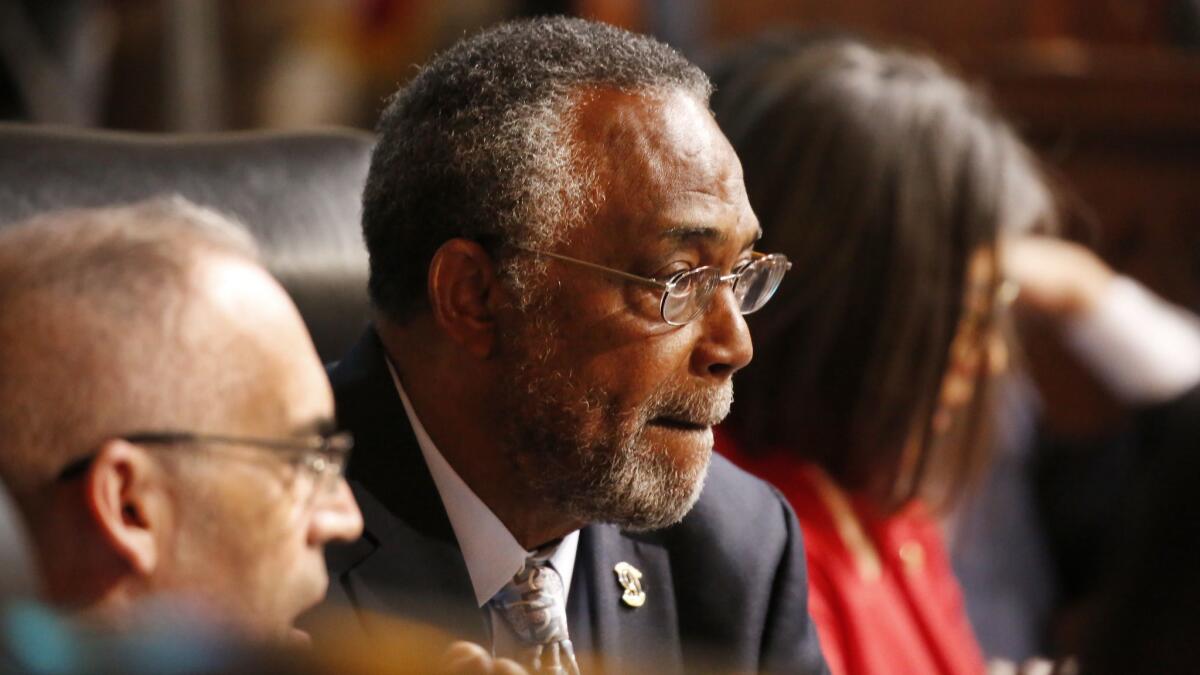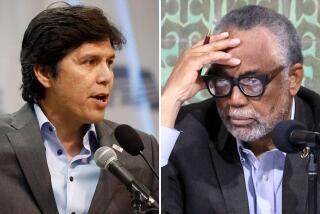L.A. councilman has voted on decisions involving his wife’s clients

Los Angeles City Councilman Curren Price has repeatedly cast votes that affected housing developers and other firms listed as clients of his wife’s consulting company, a Times review has found.
Price voted on decisions involving at least 10 companies in the same years they were listed as providing at least $10,000 in income to Del Richardson & Associates, according to his annual financial disclosures and council records reviewed by The Times.
Such public disclosures are supposed to help people check whether politicians have a financial stake in decisions they make as government officials. But the forms do not provide enough information to tell whether the council decisions would directly affect the compensation for Del Richardson & Associates.
A Price spokeswoman said that neither the councilman nor his wife, Del Richardson, had benefited financially from the votes initially identified by The Times.
Price “believed that his participation was allowable either because the companies involved were not sources of income at the time or because his votes would not affect Ms. Richardson’s business in any way,” spokeswoman Angelina Valencia said.
In reaction to questions about additional votes later identified by The Times, Valencia added that Price “has never cast a vote thinking of his or his wife’s financial interest.” Richardson said her firm had been around long before she met her husband and that she had established her business relationships in L.A. through her own hard work and expertise.
California law bars any public official from making or participating in any governmental decision “in which he knows or has reason to know he has a financial interest.” Whether a particular decision violates those rules can hinge on a complicated set of factors, including whether a financial effect is significant enough and “reasonably foreseeable.”
Several Richardson clients contacted by The Times said the council decisions involving their companies had not affected how much the firm was paid.
‘Never said a word to me about it’
Price did not respond to requests for further details about the timing of the reported income. Rey López-Calderón, executive director of California Common Cause, which advocates for open and accountable government, said that the councilman needs to spell out more details about the financial relationships with those companies.
“If they can prove that it was absolutely just coincidental that these happened in the same year,” the public could be reassured there is no conflict, López-Calderón said. “But the burden is on them.”
Price voted repeatedly on matters affecting Thomas Safran & Associates, a housing developer that he has listed as an income source for Del Richardson & Associates. Four years ago, Price voted to authorize the issuance of supplemental bonds to help finance Park Plaza, a Safran project in South L.A.
The Safran firm was not named on the agenda item for that vote, but was listed as the developer on city reports. Company chairman Thomas Safran said that Del Richardson & Associates was hired to help relocate residents for the Park Plaza project, but stressed that the compensation agreement was struck before Price had taken office.
“I can assure you that Curren Price never said a word to me about it,” Safran said.
Price and Richardson were legally married last year in Idaho, according to his spokeswoman. However, the councilman indicated on the forms that Del Richardson & Associates was his spouse’s firm as early as 2013. The Times also found that, in some cases, companies said they had not paid Del Richardson & Associates in the specific years reported on the disclosures.
The votes and apparent discrepancies on the financial disclosures raise questions about how Price has monitored possible conflicts of interest arising from his wife’s business, which provides relocation assistance and other services to a long list of private firms and government agencies.
Ethics experts say the situation also underscores the limitations of the public forms — known as Form 700s — in understanding the financial interests of politicians.
None of the council decisions identified by The Times were divided votes. In some cases, the connection between the council decisions and those companies was not immediately obvious from the City Council meeting agenda or initial motion; in others, the companies were mentioned by name.
Loyola Law School professor Jessica Levinson, who previously served on the City Ethics Commission, said that the votes at a minimum “raise an appearance issue.”
“If the story is that Del Richardson does business for these companies, and Curren Price takes votes on these companies, that erodes public trust,” Levinson said.
City Council votes affected housing developers
Price sits on an influential council committee that vets development and planning decisions. Many of the votes identified by The Times were related to housing developments: One of the companies listed by Price as a source of income to his wife’s firm was Retirement Housing Foundation.
Price voted to loan more than $1 million to the Crenshaw Gardens affordable-housing project in 2016. The council motion identified the developer as Retirement Housing Foundation.
A Retirement Housing Foundation spokesman said that, to the best of his knowledge, Richardson’s compensation that year would not have been affected by the council vote. Several other clients, including the East L.A. Community Corp. and EAH Housing, said the same about the council votes.
In some cases, the companies said that Richardson had worked on different projects than those involved in the council votes.
For instance, in 2017, Price voted to approve the selection of GTM Holdings and another company to redevelop parking lots in Lincoln Heights with housing. His disclosure forms listed the real estate firm as having provided income to Del Richardson & Associates that same year.
GTM, however, said in an email that Richardson had been hired to work on a relocation plan for a different development in South Los Angeles and that she had been paid by a different entity, not GTM, and not in that year.
One company listed on the financial disclosures — Relevant Group — said the Richardson firm had never worked for them at all. Richardson said Relevant had been “inadvertently included” by her staff on a recently filed disclosure form.
Price voted earlier this year to approve a Hollywood hotel project linked to Relevant Group, which was opposed by critics who have since sued the city.
Councilman has faced questions about wife’s business ties
In an ethics handbook, L.A. cautions city officials that a conflict could arise from a source of income for their family members, but adds that having such a financial interest “does not necessarily mean that you have a conflict, as other factors may be involved.”
The handbook urges officials to contact the City Attorney’s Office to determine if they have a conflict. Rob Wilcox, a spokesman for the City Attorney’s Office, said it had provided confidential advice to Price on the issue and “cannot discuss the advice further.”
Four years ago, Richardson told a city employee in an email that the City Attorney’s Office had been unsure how to handle her as a “working spouse of a standing city council member.”
“[A]t one point I was told anyone I spoke to, worked with etc. that did or wanted to do any business with the city of LA while my husband was in office would be conflicted as long as he held office,” Richardson wrote. “Then I was told that if I had a contract or relationship prior to him taking office I was ok. Then it was if I had an 8 year history I was ok.”
Richardson told The Times that the email was “an example of my effort to use appropriate diligence.”
“I am very proud of my track record and will continue to take all reasonable steps to avoid any conflicts of interest,” Richardson said in an email.
Critics have raised concerns about such business ties before.
Price did not vote on one recent project, Crossroads Hollywood, amid concerns about Richardson’s involvement as a relocation consultant for the project. Valencia said Price had “recused himself where appropriate” but did not specify when.
The councilman has also faced questions about whether he had finalized a divorce with his previous wife before remarrying. Two years ago, in reaction to questions about the divorce, Price told The Times he was married to Richardson, but declined to say where and when they had wed. Valencia said that at the time of that interview, he believed they were legally married.
Price has been under additional scrutiny after he was named among more than a dozen people on a federal warrant seeking evidence of possible crimes including bribery and money laundering.
The federal warrant did not say that agents had gathered any evidence of criminal activity by the individuals named. No one has been publicly charged in the investigation.
Times staff writer David Zahniser contributed to this report.
More to Read
Sign up for Essential California
The most important California stories and recommendations in your inbox every morning.
You may occasionally receive promotional content from the Los Angeles Times.











